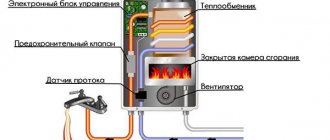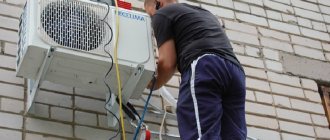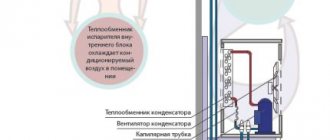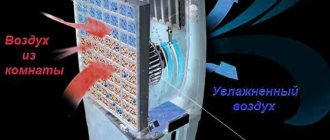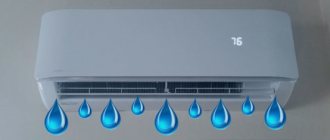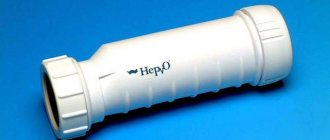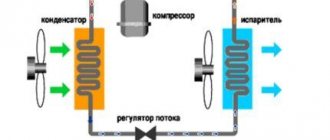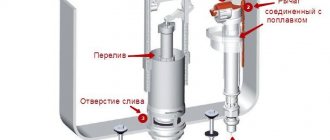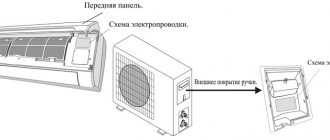It often happens that after several years of trouble-free use of the air conditioner, it suddenly begins to make an unpleasant noise. Agree, it is quite stupid to throw away equipment just because of a slight crackling during operation, especially if it is a branded air conditioner.
Even such a seemingly harmless “symptom” can signal a serious malfunction, which can cause the final breakdown of the climate control equipment. To restore normal operation of the equipment, it is important to accurately determine the causes of air conditioner noise and eliminate them in time.
Annoying noise may also occur due to improper installation, but in this case, the first signs of malfunction will appear in the first months after the start of operation. Later in the article you will learn how you can recognize the type of breakdown by the type of noise and quickly fix it without the help of a technician.
How to get rid of air conditioner noise?
The method of eliminating noise during operation of the air conditioner is determined depending on the cause of its occurrence.
Let's look at the most common faults that cause atypical sounds and how to get rid of them. How to get rid of noise:
- A crackling sound is heard when the air conditioner operates. It can occur due to thermal expansion of the housing under the influence of temperature. This problem is often short-term and does not require attention.
- A crackling noise occurs when the compressor fails or the fan impeller is damaged. In both cases, replacement of damaged parts is necessary.
- Knock when turning on the split system. Occurs when components are loosened. You need to check these parts and tighten them if necessary.
- Vibration with increasing amplitude. A very serious problem that requires an immediate solution. The cause of the problem may be a faulty compressor, unbalanced motor or fan drive. Only a master can correct the situation.
- Vibration during operation of the air conditioner can also occur due to improper installation of the unit. In this case, it needs to be dismantled and reinstalled.
- If you hear hissing sounds when you turn it on, you need to check the freon pipes, as the cause of the noise may be a refrigerant leak or broken pipes. It is better to entrust repair work to specialists.
The loud noise that occurs when the air conditioner operates cannot be ignored. Minor equipment malfunctions caused by sound effects can be easily eliminated. Timely repairs will eliminate more serious breakdowns that entail large costs or complete replacement of climate control equipment.
- https://ventilationpro.ru/konditsionirovanie/pochemu-shumit-kondicioner-osnovnye-prichiny-i-sposoby-ikh-ustraneniya.html
- https://formulaklimata.ru/blog/pochemu-shumit-kondicioner/
- https://vsekondicioneri.ru/blog/konditsioner-silno-shumit-prichiny-chto-delat/
What to do to find out the reason
If the noise still seems suspicious, you need to make sure that all operating rules for the device are strictly followed:
- the refrigerator is installed on a flat surface;
- the unit does not touch walls, other appliances, or furniture;
- electrical wiring is not damaged;
- the products in the chamber are at some distance from each other;
- the refrigerator defrosts in a timely manner;
- The device does not have an option activated, due to which the compressor noise may increase (for example, intensive cooling mode).
Even when contacting a specialist, you should try to determine the type of noise. Sometimes repair service employees give advice over the phone that allows you to deal with the problem on your own.
The nature of the noise varies depending on the type of fault:
- Vibration in most cases is due to improper placement of the device.
- Creaking and grinding noises indicate a fan malfunction.
- A humming noise may be a sign of a compressor failure.
Sounds to be careful with
There are noises that may be harmless, but may also indicate a breakdown of air conditioning equipment. These sounds include:
- The air conditioner makes clicking noises. Most often, such clicking occurs when turning on and off the compressor, fan and automation, and the reason for this is the normal functioning of the relay. If loud clicks appear during operation and are accompanied by a change in the tone of the equipment, then immediately contact a service center.
- The sound of dripping water is most often considered safe. The air conditioner may make these bursts when the heat exchanger defrosts, especially if it is in defrost mode. It is best to carefully inspect the unit to rule out a failed sump pump or a clogged drain system.
- A change in the sound of the external unit of the split system in windy weather changes the noise of the air conditioning equipment as a whole. But, if this phenomenon appears in calm weather and continues for several days, then this may be caused by debris getting inside the external unit, interfering with the rotation of the fan blades .
- The air conditioner makes a "gurgling" sound. As a rule, this sound occurs when air enters the drainage bath during strong winds. A strong wind can overcome all bends in the drainage hose and break into the condensate collection pan. “Gurgling” may be the result of a kinked drain pipe, or it may indicate more serious problems - air entering the refrigeration circuit of the split system when the volume of refrigerant decreases.
Experience shows that most problems caused by the appearance of such sounds should not be ignored. For your own peace of mind, it is best to contact service center specialists for diagnostic measures.
Noise standards for air conditioning equipment
The consequences of noise that air conditioners can create should not be underestimated, because vibration and sound pressure can create serious inconvenience not only for the owner of the equipment, but also for his neighbors. In general, the noise level is regulated by current sanitary standards. Based on SN 2.2.4/2.1.8.562-96, the permissible penetrating noise level in residential premises is equal to:
- from 700 to 2300 – 40 dBa;
- from 2300 to 700 – 30 dBa.
Not everyone has a device that can be used to measure the level of sound produced by your climate control equipment. To understand how much 30 dB is allowed by regulations, you should imagine a clock ticking. The sound level emitted by a mechanical watch is approximately 30 dB. A normal human conversation in a room creates a sound pressure equivalent to 40 dB.
If you understand that the noise level of the air conditioner exceeds the specified indicators, then you need to take immediate action.
Solving the problem with gurgling air conditioner
There are two ways to solve the pressing problem associated with the incorrect operation of the cooler. If the air conditioner is noisy and the annoying sounds do not stop, the owner has the right to fix the problem himself. First, he should inspect the housing and check the drainage pipe. Problems caused by improper air intake are quickly corrected as soon as the pipe is aligned to its original position. A siphon for an air conditioner is a universal device that allows you to drain unnecessary condensate. With the help of special equipment, the air blowing stops.
The cost of delaying troubleshooting
The gurgling indoor unit needs urgent repair work. Due to systematic failures, serviceable parts are subject to increased stress. The cost of delay is equal to the cost of repair, and the longer the owner of the air conditioner delays contacting a repairman, the more significant the amount for new elements for the cooler will be.
The air conditioner creates noise when the wind is in the wrong direction (direction), when the installation of a complex structure was not carried out in accordance with building codes. A similar situation occurs when untrained people install the air conditioner. The cost of the error is not immediately visible, but only over time - the block (external or parts of the internal) cooler does not withstand the influence of the environment.
When the cooler is turned off, it makes noise for a reason, because while in “sleep” mode, the device remains connected to the power supply. A routine inspection of the air conditioning unit, even without obvious causes of problems, will prevent many negative changes in the operation of the air conditioner.
Strong winds can damage the air conditioner if installed incorrectly.
Why does gurgling start after the air conditioner is turned off?
Some owners find it funny, others don't notice, but a prolonged gurgling sound can also cause serious irritation. You should not ignore the phenomenon when the air conditioner gurgles - this is a very alarming signal that can mean a complex breakdown, which will require significant financial investments for repairs. So, why does the air conditioner crackle and gurgle? I thought it was the batteries because the temperature dropped, but it turned out that the air conditioner was making strange gurgling sounds.
When gurgling is heard when the air conditioner is turned on, and clearly inside the device itself, and not along the drainage path, the reason is in the cooling circuit. Or more precisely, that you have an insufficient level of freon in the system. As they are pumped through the pipe system, the air pockets seem to break through with freon and this can cause an extraneous sound from the air conditioner. Pumping through a system of tubes, the air pockets seem to break through with freon and this is why sound occurs. You can’t solve this problem on your own; only an experienced air conditioner technician can help. Here we tried to analyze the main reasons why the air conditioner gurgles. If it gurgles not only in this case, then there is a smell of air in the refrigeration circuit.
Moreover, if the air conditioner is gurgling when the air conditioner is turned off, then the problem area is the cooler circuit - there is an air lock in the path of the refrigerant. I suspect that this is air coming inside through the drain tube and gurgling in the standing condensate (water). Moreover, this happens even when the air conditioner is not working.
Hello. Gurgling sounds in the air conditioner are considered normal when it starts (enters operating mode) or when it stops (within 5-10 minutes). In other cases, gurgling in the air conditioner means that errors were made during its installation. In this case, the amount of freon decreases, which is replaced by air, which causes the characteristic gurgling sound. Most often, airing occurs in winter or from wind during strong gusts. It enters through the pipe from the outdoor unit in a gaseous state, and when the gas enters the heat exchanger of the indoor unit, it condenses. The refrigerant passing through them makes similar sounds. To fix this problem, you need to call an adjuster.
Gurgling noise in the air conditioner is a clear sign of insufficient refrigerant, freon. It is worth adding gas to the required level, but this can be done with the necessary equipment and certain qualifications.
Gurgling is considered normal only when the air conditioner is turned on or stopped, and if it gurgles in other situations, then these are problems that apparently occurred during troubleshooting. In this case, you need to call a specialist.
One of the reasons when the air conditioner makes gurgling sounds in winter is that the system may be air-filled. For example, due to a leak, the amount of freon in the system decreases and its place is taken by air. As they are pumped through the pipe system, the air pockets seem to break through with freon and this can cause an extraneous sound from the air conditioner.
Gurgling sounds appeared in the air conditioner that was disconnected from the network (for the winter period). I found on the Internet a solution for this air conditioner: plug the drain pipe with a rag. Gurgling is also observed if condensation remains in the system. Gurgling and hissing of freon can be heard when the compressor is turned on or off. Cracking can occur when housing parts contract or expand due to temperature changes.
The air conditioner makes gurgling sounds - move the drain system pipe, blow out the siphon, replace the drain compressor filters. If the air conditioner is working and continues to cool the room, then eliminating this defect can be delayed. But if you have obvious problems with cooling, you need to call a technician without delay, having first turned off the air conditioning system, or switched the air conditioner to “fan” mode. A siphon for an air conditioner is a universal device that allows you to drain unnecessary condensate.
If the outdoor unit of the air conditioner clicks, a breakdown has occurred in the outdoor unit and the sound comes from the compressor relay. This situation is not only unpleasant, it can lead to serious damage to the air conditioner. It entails expensive repairs.
Standard vibration
Let us first consider standard cases so that they can be immediately excluded as not dangerous.
Engine vibration at idle speed
It is no secret that the air conditioner absorbs part of the engine power, which increases fuel consumption by an average of 1 liter per 100 km.
If the interior cooling system was activated immediately after the car started, then the sudden additional load on the engine, which at that time is running at low speed, causes interruptions in its operation and it begins to vibrate. It will feel good in the cabin.
Naturally, the ECU takes this moment into account and within a couple of seconds the crankshaft speed is corrected and everything returns to normal operation.
If, for example, you turn on the air conditioner at 3000 rpm, you can see how the tachometer needle goes down a little, but after a moment it returns back and there is no vibration.
Vibration from engine cooling fan
When the air conditioner is turned on, the engine cooling fan also starts working in parallel.
On some car models, either due to poor balancing, or due to some defects, it vibrates and it feels like the engine is vibrating (we are talking about idle speed).
To make sure of this, turn off the fan and turn on the air conditioner; if the shaking disappears, then the problem is in it.
Why did we classify this as a normal situation? Yes, because the officials do not consider this a problem and they refuse to solve it, even under warranty.
It can be solved by flashing the ECU and raising the idle by at least 100 rpm.
Cars with automatic transmission
Many owners of cars with an automatic transmission complain that at low speeds (up to about 750) and when the gear lever is in position D and the brake pedal is depressed, a slight vibration occurs that comes from the engine, this problem is especially typical for Toyota Corolla when the air conditioning is turned on. As soon as the brake pedal is released, the vibration disappears.
The fan crackles and rattles
After removing the protective grille, turn the propeller to see if it touches elements of adjacent structures, and a cracking sound would be heard. If the propeller moves crookedly, the engine is disassembled and the bearings are checked for worn balls, broken separators, and a crooked axle. The fact is that a “crookedly” spinning or split propeller breaks the fan mechanics, and you can hear the cracking and creaking of broken bearings. The broken propeller is replaced. Faulty balls and crowns are also replaced with new ones. The crooked axis is either leveled and balanced, or another one is installed - from the same motor.
The task is to ensure smooth, vibration-free rotation of the propeller. After dripping a little oil into the bearings, the motor with the propeller on is suspended on a bendable support and turned on and allowed to run for several minutes. If the fan does not vibrate and does not rock the support, the motor is re-opened, lithol or grease is filled into the bearings, assembled and put back into the block. If the winding is burned out, then install a new motor. The convector (fan) of the indoor unit has the same problem. The engine is disassembled, cleaned and lubricated once a season or six months. Worn balls and a broken propeller must be replaced.
The main causes of noise from the outdoor and indoor units
If unusual sounds from your air conditioner appear, you should contact a service organization. But you need to be prepared for significant costs when repairing your climate control equipment. Based on the nature of the sound, you can independently determine the cause with a high degree of probability and then decide on methods to eliminate it. The algorithm for independent actions is as follows: when strong noise appears, first of all, it is necessary to determine in which block it appears and establish the nature of the noise that appears. Uncharacteristic noise in the indoor unit of the split system
- A rumble is heard when the fan is running. The problem may be in the fan bearing or in a change in the geometry of the impeller. The problem may also arise due to the formation of ice, to which the fan blades cling when the device is operating.
- A fairly strong low-frequency sound is heard. The problem usually lies in the electrical part of the internal unit of the split system, namely in the transformer. The transformer begins to hum before it fails or due to weak fastening.
- Hissing occurs when there is a refrigerant leak, when the diameter of the pipes changes due to their bending, when the pipes are clogged, etc.
- Loud noise caused by vibration. As a rule, the problem lies in an unbalanced impeller.
- The hum may be caused by dirty filters and heat exchanger.
In addition to all of the above, the indoor unit of the air conditioner often makes noise due to problems with the drainage pump, which needs to be cleaned, and if the problems persist, then replaced. https://www.youtube.com/watch?v=q9mtzFK8C48
Loud noise in the external unit of the split system
Sounds from the air conditioner condenser unit can be made by the fan, compressor, and enclosure grille. In addition, there are noises that occur due to improper or insufficient fastening of the device to the wall. Let's look at them in more detail.
- The hum produced by the vibration of the external unit of the air conditioner. As a rule, the problem is the lack of vibration dampers on the mounts. It happens that the problem arose due to the great depth to which the anchor bolts are recessed in the wall. The bolt may contact the slab reinforcement and transmit vibration to the entire wall.
- A worn out compressor can produce a fairly strong sound.
- Noise can be generated by a protective grille that is poorly secured to the air conditioner.
- An unbalanced impeller makes a noise when its blades catch on the heat exchanger or the protective structure of the device.
The outdoor unit of the air conditioner makes noise when a large layer of ice forms, which interferes with the operation of the fan.
Poor quality assembly
It should be noted that this problem can most often be encountered when purchasing air conditioners that are not very expensive. They may periodically emit a hum, regardless of the operating mode. This spontaneous cracking and noise occurs due to poor quality assembly.
In this case, you need to disassemble the case and try to tighten absolutely all the screws and bolts. In particular, you need to carefully inspect the compressor from which the greatest vibration comes. If there are no vibration dampers, you should make them yourself. To do this, take ordinary rubber, the thickness of which ranges from 4 mm to 6 mm.
In cheap models, sometimes there is no heat-insulating layer on the copper tubes, so during operation they can touch other parts, thereby causing side noise. This problem can be eliminated by purchasing thermal insulation of the appropriate diameter and insulating the tubes. It would be a good idea to inspect all elements of the outdoor unit. They should not be at a very close distance from places or parts when touched that cause vibration. If there are any, it is necessary to lay rubber bands, securing them with plastic clamps, or to carry out thermal insulation.
Preventing air conditioner gurgling
To avoid the occurrence of extraneous noise, including gurgling, during equipment operation, maintenance of the air conditioner is necessary.
In addition, you need to call a technician at least once every few years to diagnose the entire system; if necessary, he will top up with freon and inspect the line to identify damage.
In addition, the user can also harm the equipment if, for example, he cleans it incorrectly or installs it incorrectly - all this usually leads not only to extraneous noise, but also to failure of the device. Remember that calling a technician will cost you less than the likely repair.
From all of the above, we can conclude that gurgling in an air conditioner is an almost normal sound, which quite often becomes the cause of a fatal breakdown. However, if he is intrusive or suspicious, appropriate action must be taken. First you need to find out why the system is gurgling.
To do this, you need to detect the places where the sound comes from and pay attention to other factors - weather conditions, operating mode and much more. This way you can understand what was wrong with the device and decide how exactly to fix the problem.
Preventive measures will allow the split system to be used for many years, and it, in turn, will create comfortable living conditions for its owners. In the event of any malfunction of the equipment, diagnosis or repair cannot be delayed, as this leads to additional costs.
- https://morrozko.ru/konditsioner-hlyupaet-i-bulkaet-chto-pri-etom-delat/
- https://ventihome.ru/mikroklimat/kondicionirovanie/bulkaet-konditsioner-pochemu.html
- https://strojdvor.ru/kondicionirovanie/obsluzhivanie/pochemu-kondicioner-bulkaet-v-nerabochem-sostoyanii-pri-vetre/
- https://celsis.ru/publikacii/pochemu-bulkaet-kondiczioner
Solving the problem with gurgling air conditioner
There are two ways to solve the pressing problem associated with the incorrect operation of the cooler. If the air conditioner is noisy and the annoying sounds do not stop, the owner has the right to fix the problem himself. First, he should inspect the housing and check the drainage pipe. Problems caused by improper air intake are quickly corrected as soon as the pipe is aligned to its original position. A siphon for an air conditioner is a universal device that allows you to drain unnecessary condensate. With the help of special equipment, the air blowing stops.
Calling a technician will take less time than searching for a breakdown on your own. An experienced specialist can easily determine the cause of the noise disturbing the household. Automation malfunctions are the most serious and complex, so eliminating them requires certain knowledge and skills.
The cost of delaying troubleshooting
The gurgling indoor unit needs urgent repair work. Due to systematic failures, serviceable parts are subject to increased stress. The cost of delay is equal to the cost of repair, and the longer the owner of the air conditioner delays contacting a repairman, the more significant the amount for new elements for the cooler will be.
The air conditioner creates noise when the wind is in the wrong direction (direction), when the installation of a complex structure was not carried out in accordance with building codes. A similar situation occurs when untrained people install the air conditioner. The cost of the error is not immediately visible, but only over time - the block (external or parts of the internal) cooler does not withstand the influence of the environment.
When the cooler is turned off, it makes noise for a reason, because while in “sleep” mode, the device remains connected to the power supply. A routine inspection of the air conditioning unit, even without obvious causes of problems, will prevent many negative changes in the operation of the air conditioner.
Strong winds can damage the air conditioner if installed incorrectly.
The fan (impeller) is cracking
Fan blades can crack due to mechanical damage or simply over time. This can be determined visually; the problem is characterized by crackling or clicking sounds. This sound is caused by the two edges rubbing against each other at the crack. It is not difficult to solve the issue - buy a new fan and replace it.
Sometimes a not particularly loud crackling sound appears, which almost merges into a hum. Most likely there is a problem with the fan bearing. Remove the impeller and old bearing. Choose the same size and install it instead of the old one.
When operating for heating, ice may form on the radiator of the outdoor unit. There may be several reasons:
- There is low temperature and high humidity outside;
- The radiator is dirty;
- There is not enough freon in the system;
- After complete freezing outside, the ice melted but remained inside;
- There is a crack in the line through which the refrigerant is escaping.
Try to solve the problem yourself. First, turn off the air conditioner and wait until the ice melts (you can speed up the process with a regular hair dryer). Clean it from dirt (read more about this in the article “How to clean an air conditioner at home yourself - step-by-step instructions”)
Change the operating mode of the air conditioner - lower the temperature by 1-3 degrees. If possible, reduce the blowing speed by one point. If ice forms on the radiator, you will have to call a technician. You can find a good air conditioner using the PROFI.RU specialist search service.
It happens that the outdoor unit of the air conditioner hums when heating, but when cooling it works normally. Most likely the problem is a large difference between the temperature in the house and outside. There are three options to resolve the issue:
- Insulate the outdoor unit;
- Reduce heating temperature;
- Install a winter kit with heating of the outdoor unit.
Frozen outdoor air conditioner unit. When the ice outside melts, some of it will remain on the radiator for a long time.
Read also:
Causes of leakage in the outdoor unit of the air conditioner
See also:
- Ventilation design
- Which split system is better: inverter or conventional?
- How does a ducted air conditioner work?
- How to clean your home air conditioner
- How to clean your air conditioner yourself
- How to choose an air conditioner for your cottage
- Which is better: climate control or air conditioning?
- How to remove an air conditioner with your own hands
- How to calculate the power of an air conditioner
- How to reduce the noise of the hood?
- How to install an air conditioner yourself
- How to install air conditioning on the balcony
- Why doesn't the air conditioner blow warm air?
- How to connect the hood?
- Why does the air conditioner stink?
When to contact the service center
The design of modern climate control systems includes software and hardware systems operating in tandem. Malfunctions arise mainly as a result of untimely maintenance or mechanical damage. However, in the absence of the necessary experience and knowledge in the field of climate control technology, it is highly not recommended to open the air conditioner and begin an independent search for the cause of extraneous noise.
When using climate control equipment with a valid warranty period, you don’t need to think about what to do and where to go. If previously unnoticed noises appear, the only correct solution in this case is to call the company’s service center team. Thanks to the professional experience of the craftsmen and the use of original components, efficiency and high quality of the work performed will be guaranteed.
So, timely maintenance of the split system is the basis for the proper and durable functioning of climate control equipment. Sudden, unusual noises almost always indicate a malfunction in the air conditioning system. And the failure of such equipment in extreme heat is a huge problem. If, while in a car, it is enough to simply open the windows, then such manipulations in a large room will not save you from the excruciating heat. Therefore, the equipment should be operated in accordance with the user manual. It is also necessary to regularly carry out preventive measures. But some breakdowns can be repaired yourself.
Troubleshooting
In most cases, the owner of the equipment can eliminate the cause of the gurgling sound with his own hands. But in some situations, the help of specialists may be required. First of all, you need to try to find where the sound is coming from. This can be an indoor or outdoor unit, a highway or a drainage system. Next, you need to understand exactly when the gurgling noise occurs - during operation or when turned off, when the equipment is started for cooling or heating, during rain, snow, wind or frost, etc.
In the drainage
If during installation the drainage hose was installed correctly, with the recommended slope, then the moisture generated during operation should pour out. If errors were made when placing the tube, for example, an incorrect angle of inclination was made or kinks were made, a situation may arise when the condensate does not drain, but stagnates in the hose. In this case, when the wind blows inside the tube, the moisture begins to move, which is why gurgling occurs.
Similar sounds also appear if the drainage is connected to the sewer. In this case, noise may occur in the drain pipes or in the water seal through which the connection is made. Next, the gurgling sound is transmitted through the hose into the room where people hear it. This happens even when the air conditioner is turned off.
Although noise in this case does not indicate a malfunction of the device, it can disturb users and must be eliminated. You can do this on your own, without calling in specialists.
- The drainage hose going out must be given the correct slope, any bends eliminated, and then fixed so that the wind does not blow inward.
- You can extend the drainage tube, lowering it virtually to the ground, this will also solve the problem.
- Additionally, it is recommended to clean the drainage system itself, including the pan in the indoor unit of the air conditioner, as it can also become a source of unpleasant noise.
- The tube connected directly to the sewer must be pulled out and then installed through a special siphon for climate control equipment. With this connection, air blowing into the drainage system is completely eliminated.
In the freon circuit
If, after inspecting the drainage system, the cause of the noise has not been identified, it is necessary to check the condition of the route. As a result of improper installation, failure to vacuum, incorrect filling with freon, damage to copper pipes, their insufficient length, significant bends or other reasons, air plugs could form inside the system - when freon breaks through them, a gurgling sound is heard.
Sometimes owners of climate control equipment note that the outdoor unit whistles or beeps when turned on, and not just gurgles. This is another sign of kinked main pipes. In this case, the free movement of the refrigerant is hampered, which is why the corresponding sound appears.
In other places
In addition to the pipeline and drainage system, it is necessary to check the condition of the indoor and outdoor units. Thus, insects could live in an evaporator located indoors. It is not recommended to leave them inside, as they can damage equipment and also cause harm to humans (for example, wasps or bees).
There are other reasons for the appearance of extraneous noise. For example, a split system may make humming, gurgling, and crackling noises during defrost mode. It turns on periodically during the cold season to remove ice from a frozen outdoor unit. These sounds should not cause alarm, as they accompany the normal functioning of the climate system.
The most popular air conditioners of 2021
Split system Mitsubishi Electric MSZ-LN25VG / MUZ-LN25VG on Yandex Market
Split system Ballu BSVP-07HN1 on Yandex Market
Split system Panasonic CS/CU-BE25TKE on Yandex Market
Split system General Climate GC/GU-EAF09HRN1 on Yandex Market
Split system Ballu BSD-09HN1 on Yandex Market
It's no secret that a working air conditioner creates characteristic sounds that are characteristic of it. Over time, everyone gets used to this noise, because it is absolutely natural and will disappear only if you turn off the air conditioner
All you have to do is get used to these noises, and it won’t be that difficult, considering that it’s a monotonous sound that you subsequently stop paying attention to.
WHAT ARE THE ADVANTAGES OF REPAIR BY CLIMATHOL COMPANY MASTERS?
Free visit of a technician Free diagnostics of a breakdown Repair - from 600 rubles Flexible system of discounts
The optimal noise level for any air conditioner is 22-28 dB. This sound is produced by a running fan, which creates a comfortable temperature in the room. Of course, other extraneous sounds may also be produced that are considered normal. Normal sounds are:
* Clicking noises made when the fan and compressor are turned off or on.
* The indoor unit may make a cracking noise if the air conditioner is made of low-quality plastic.
* The movement of freon makes a noise similar to water flowing through a pipe. Reminds me of the sound of a running refrigerator.
Video: LG GA-E499ZAQZ refrigerator – compressor hum (noise)
Refrigerator LG GA-E499ZAQZ hum (noise) of the compressor (see in headphones)
Watch this video on YouTube
I recommend to read:
- Why is the LG No Frost refrigerator humming - The presence of a No Frost system in an LG refrigerator implies the presence and operation of a fan that distributes cooled air inside the refrigerator. Know that...
- Why the refrigerator hums: reasons - Every refrigerator hums during operation - the average noise level is 38-44 dB. If it makes more noise, uncomfortable conditions are created both in the kitchen and in other rooms. Sometimes…
- Why does the refrigerator click? — Extraneous noises hint at the presence of a technical malfunction, but this is not always the case. If your refrigerator compressor is cracking, you need to take the right measures. Such a major breakdown...
- Replacing the Atlant refrigerator fan - A non-working fan is a common malfunction that requires an immediate solution, because... could lead to more serious and costly damage...
- Why does the refrigerator turn on, then immediately turn off and not freeze? — At the current level of development of technology and daily household needs, a refrigerator is an indispensable device. But no equipment can last forever, and refrigerators are no exception...
- The refrigerator does not freeze: how to solve a household problem - A common problem in the refrigerator is the lack of the required temperature. There are many reasons why it stops freezing. Sometimes they can be easily eliminated with your own hands...
- Replacing the evaporator sensor of an Atlant refrigerator with your own hands - Replacing evaporator sensors in a refrigerator is not such a frequent, but common repair. The resistor responsible for temperature, even in expensive models, remains fragile and capricious...
What to do if the air conditioner gurgles?
Why equipment can gurgle - we figured it out. Now about what to do.
If the device makes gurgling sounds, before calling a technician, the first thing you need to do is:
Pay attention to when exactly the sound is heard. When the device is running or off? When operating for heating or cooling? In strong winds or frost? Try to find the place where the gurgling noise is coming from
Indoor unit? Outdoor unit? Tube between them?
In principle, this is everything that can be done independently, without calling a specialist.
Since most often the air conditioner gurgles due to an incorrectly installed drain pipe, a specialist will have to work with it. It can either be extended, straightened (if there was a bend), or bent down so that the air does not blow in.
If the problem is freon, repairs are carried out individually, depending on the model and the exact cause.
An air conditioner gurgles - a phenomenon that causes bewilderment, laughter, and even anger among the owners of coolers. A simple but expensive unit for your home or office can produce annoying, too loud sounds when problems occur. What to do in such cases? Gurgling in an air conditioner is always an alarming sign, which is an unaffordable luxury to ignore, because expensive repairs will cost twice as much as timely diagnostics of the entire climate control device. The characteristic sound is difficult to confuse with similar noise atypical for an air conditioner, but it is still difficult for an inexperienced person to determine the true deviations in the operation of the cooler (only by ear). If the air conditioner gurgles, and calling a technician is impossible for various reasons, then the owner of the device should understand the probable causes of the problem.
Gurgling in the air conditioner is a signal of a problem
Violation of the freon circuit
When working to heat a room using an air conditioner, the evaporator and condenser change their purpose. Freon pumped into the system enters the evaporator in a liquid state. Here it condenses and heats up greatly, up to a temperature of 60-80 degrees. The compressor circulates warm air and warms up the room. This is the reverse process of cooling, in which the formation of liquid from gas occurs directly in the condenser unit.
From the evaporator, liquid freon enters the outdoor unit, and this liquid may “gurgle.” The structure in which the processes of evaporation and further condensation of freon occur is completely isolated. If the air conditioner is in working condition, this phenomenon is basically impossible.
Freon circulates in copper tubes, which are sometimes damaged during installation, which violates the integrity of the system and leads to refrigerant leakage and its partial replacement with atmospheric air or moisture. Due to the different compression densities of substances entering the system, gurgling sounds occur.
Home air conditioner gurgles constantly
The drainage pipe, which is responsible for blowing air into the cooler, is exposed to the environment around the clock. Stagnant condensation can cause unpleasant gurgling sounds. The owner of the air conditioner should ensure that the drain pipe is in its natural position. The refrigerant is also checked, because in cases where freon is replaced by air, the air conditioner begins to make noise. Fixing such a breakdown can only be done by an experienced technician and under one condition – high-quality materials will be used in the repair.
Insects, which often get inside the structure, can settle in it and live fully inside individual parts. The buzzing of unwanted neighbors resembles the murmur of water, so it is quite easy to confuse two noises of different origins.
Bees may take up residence in your air conditioner and make buzzing sounds.

